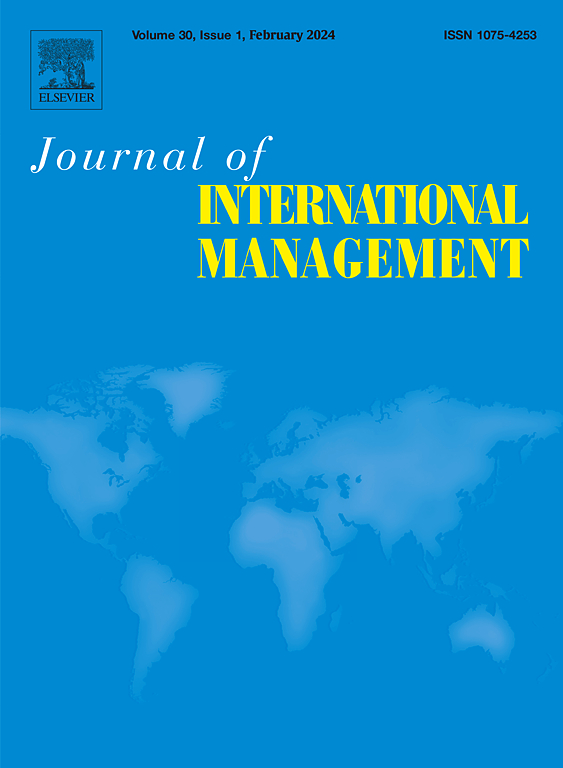Between rock and a hard place: The impact of home country demand on exclusive international strategic alliances forged by new technology ventures
IF 5.9
2区 管理学
Q1 MANAGEMENT
引用次数: 0
Abstract
This study seeks to progress the relatively thin body of scholarly research on the exclusive characteristics of strategic international alliances forged globally, particularly by new technology ventures. Due to the liability of smallness and newness, these new ventures need to strategically adopt exclusivity in licensing to secure partners across the globe to help them overcome the lack of resources and market access capability. Adopting resource dependence theory, the present study suggests that market size is a key consideration for the determinants of exclusive licensing for new technology ventures. The study investigates if the home demand of a country will influence the propensity to form exclusive international partnerships for new technology ventures. Based on the dataset of 545 international partnerships across the globe, findings of the study provide strong support to the idea that new ventures based in developed countries with limited market size (i.e., small-developed countries) are disproportionately more inclined to offer exclusive partnerships. Significant and positive moderation to the above findings were found due to the effect of sub-sectors, but not due to the size of the partner firms in the international market. The post-hoc analysis considering international and domestic alliances combined sample indicated consistent findings. The findings have theoretical, practical, and policy related implications for international strategic partnerships.
进退两难:本国需求对由新技术企业打造的独家国际战略联盟的影响
本研究旨在推动相对薄弱的关于全球战略国际联盟(特别是新技术企业)独有特征的学术研究。由于小而新,这些新企业需要在战略上采取排他性的许可,以确保在全球范围内的合作伙伴,以帮助他们克服缺乏资源和市场准入能力。本文采用资源依赖理论,认为市场规模是决定新技术企业独家许可的关键因素。该研究调查了一个国家的国内需求是否会影响为新技术企业建立排他性国际伙伴关系的倾向。基于全球545个国际伙伴关系的数据集,该研究的结果为以下观点提供了强有力的支持:市场规模有限的发达国家(即小发达国家)的新企业不成比例地更倾向于提供独家伙伴关系。由于子行业的影响,发现上述结果具有显著的正向调节作用,但不受国际市场上合作伙伴公司规模的影响。考虑到国际和国内联盟组合样本的事后分析表明了一致的结果。研究结果对国际战略伙伴关系具有理论、实践和政策意义。
本文章由计算机程序翻译,如有差异,请以英文原文为准。
求助全文
约1分钟内获得全文
求助全文
来源期刊

Journal of International Management
MANAGEMENT-
自引率
9.80%
发文量
67
审稿时长
81 days
期刊介绍:
The Journal of International Management is devoted to advancing an understanding of issues in the management of global enterprises, global management theory, and practice; and providing theoretical and managerial implications useful for the further development of research. It is designed to serve an audience of academic researchers and educators, as well as business professionals, by publishing both theoretical and empirical research relating to international management and strategy issues. JIM publishes theoretical and empirical research addressing international business strategy, comparative and cross-cultural management, risk management, organizational behavior, and human resource management, among others.
 求助内容:
求助内容: 应助结果提醒方式:
应助结果提醒方式:


